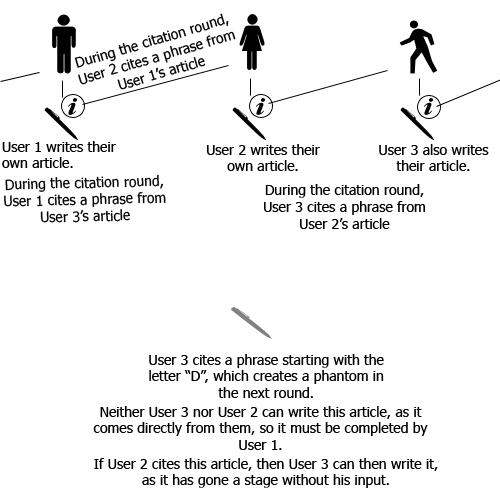User:Rorybob/Help
Good evening, good evening, good evening! It appears that you wish to learn about the Survival Lexicon, no?
Note: All bold words will be explained in full in the "Glossary" section.
Rules
- At the start of the game, a topic is chosen for the various parties to discuss.
- The topic for the Survival Lexicon is just that; Survival.
- The game is played in 8 rounds - ABC, DEF, GHI, JKL, MNO, PQRS, TUV, WXYZ.
- On the first turn, each player writes an entry for the letter 'A', 'B' or 'C'. You come up with the name of the entry, and you write 100-200 words on the subject. At the end of the article, you sign your name. Others will make one citation from that piece. Said citation will be a phantom. No letter can have more entries than the number of players, either, so all citations made on the first turn have to start with non-ABC letters.
- On the second and subsequent turns, you write an entry based upon a citation found in a previous rounds entry and others will cite three more phantoms.
- It's an academic sin to cite yourself, you can never cite an entry you've written. Incidentally, once you run out of empty slots, obviously you can only cite the phantom slots.
- Despite the fact that your peers are self-important, narrow-minded, heavily biased idiots, they are honest scholars. No matter how strained their interpretations are, their facts are accurate as historical research can make them. So if you cite an entry, you have to treat its factual content as true! (Though you can argue vociferously with the interpretation and introduce new facts that shade the interpretation.)
Example of the progression of the game:

Rule Changes
The Survival Lexicon is slightly different from the other Lexicons of this wiki. There are two main changes to the Lexicon itself.
- Instead of citing your own topic, others will now cite your topic, as you will theirs. You are not allowed to cite an article that is a direct cite of your article, or a citation by you. (As detailed above.)
- Instead of citing when the article is made, a "mini-round" has been introduced between the rounds where people should cite other topics.
Style
Before you start, you must check the page you are about to create (either by following a link or typing in the address yourself) has the prefix Lexicon:. If not, you need to add this, otherwise it won't be in the Lexicon namespace.
Example:
- Lexicon:Death -- This is a correctly formatted link.
- Death -- This is incorrectly formatted.
You also need to remember to do this when citing an article, which I will come onto later.
When writing you article, you must use {{Lexicon|Survival}} at the top. This automatically puts the article in the correct category, it also informs those that it is part of a specific Lexicon.
An article should be above 100 or 200 words. There isn't a limit to the length of the article. When finished, you must put your signature and a timestamp on the end of the article. This is usually done using four tildes, like so: ~~~~. For me, this produces: Rahrahbahb 20:38, 4 November 2009 (UTC)
Other users may have templated signatures which need to be placed on the article. For more information on templated signatures, see here.
Frequently asked questions
- If there is a phantom present, do I have to write it?
- No, you do not. If there are no other spaces left, they must be completed. But they do not have to be completed first.
- What is a "back-cite"?
- See the Glossary.
- How many citations do I need to put into an article?
- If you are citing another's article, only one. If you are back-citing, then a maximum of two. A total, therefore, of three citations per article.
- Am I citing a future article, or a past article?
- If you are citing another's article, you are citing articles for future rounds of the Lexicon.
- If I take over another player due to their inactivity, must I complete their uncompleted tasks?
- Yes. They are missing from the Lexicon and need to be completed.
Glossary
Phantom: An articles name that has no content whatsoever. They must be completed in the appropriate round.
Citation: In every article, there are words. You can link these words to another article. This usually results in a phantom, unless you back-cite.
Back-cite: In an article, you can cite an article from a previous round whilst you are writing it.